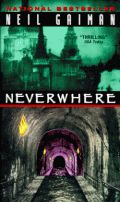 I picked up this “urban fantasy” novel by Neil Gaiman based on the fact that I had enjoyed the author’s The Graveyard Book earlier this year, as well as some of his other stuff. Turns out it’s the novelization of a BBC TV miniseries from the 1990s, which is kind of odd. Both the show and the book tell the story of Richard Mayhew, your typical sad sack archetype that is put upon by his hag of a fiance and run down by his demanding yet unfulfilling job. In a substantially darker inversion of the classic Cinderella story, Richard is yanked from that life when he stops to help a young girl and is taken away to “London Below,” a magical, shadowy world that exists in just the place its name suggests it would. Aside from Gaiman’s doing his thing with crazy world building and parading a mess of (supposedly) colorful characters across the pages, the rest of the book involves Richard’s growing a backbone and emerging from his ordeals as a much stronger and wiser version of the dope we met in the opening pages.
I picked up this “urban fantasy” novel by Neil Gaiman based on the fact that I had enjoyed the author’s The Graveyard Book earlier this year, as well as some of his other stuff. Turns out it’s the novelization of a BBC TV miniseries from the 1990s, which is kind of odd. Both the show and the book tell the story of Richard Mayhew, your typical sad sack archetype that is put upon by his hag of a fiance and run down by his demanding yet unfulfilling job. In a substantially darker inversion of the classic Cinderella story, Richard is yanked from that life when he stops to help a young girl and is taken away to “London Below,” a magical, shadowy world that exists in just the place its name suggests it would. Aside from Gaiman’s doing his thing with crazy world building and parading a mess of (supposedly) colorful characters across the pages, the rest of the book involves Richard’s growing a backbone and emerging from his ordeals as a much stronger and wiser version of the dope we met in the opening pages.
While I like the idea of urban fantasy that doesn’t center on vampires and I appreciate Gaiman’s substantial imagination, I was mostly “meh” throughout Neverwhere. I think the main problem is that the world of London Below lacks any kind of internal consistency that usually makes fantasy world building so interesting. Stuff just happens transparently because Gaiman needs it to happen to advance the plot, regardless of whether it makes sense. A prime example is the “Markets” which are migrating nightly bazaars at which our heroes can acquire various macuffins and plot devices. The Markets are in a different place each night and apparently require a dangerous trip to reach, yet the logistics of everyone’s knowing where the Markets are and how so many people brave and survive the trip is explicitly handwaived away by the characters. It all feels a bit lazy and obviously contrived, which pulls the reader out of the world. London Below just isn’t believable, even in the extremely generous context of a fantasy world.
Other than that, the book isn’t badly written for a piece of light fantasy that mostly eschews the typical tropes and cliches. And I enjoyed how Gaiman got playful with his language once in a while, as in describing how one character chose for his home the top of a tower that he found unbearably ugly, simply for the fact that at the top of the tower was the only place in London that you couldn’t see much of the tower itself. So it’s easy and occasionally fun reading, though I think Gaiman has definitely done better.
It’s worth noting that Gaiman created and wrote the original story and teleplay for the BBC series as well.
-K
Yeah, that’s true. I mentioned that it was based on a TV show, but not that Gaiman himself had penned the scripts for it. I looked up a few scenes of the show on YouTube and wasn’t particularly impressed with the production.